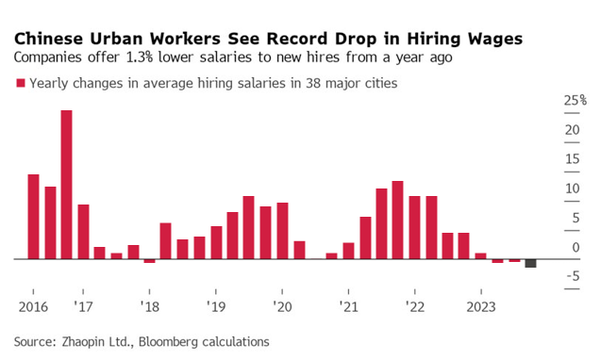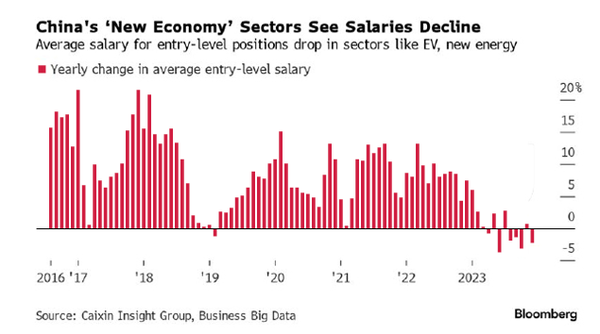The average salary paid by companies to new employees in 38 major Chinese cities fell 1.3% to 10,420 yuan ($1,458) in the fourth quarter of 2023 from a year earlier. It was the worst decline since at least 2016, according to data from online recruiting platform Zhaopin Ltd. compiled by Bloomberg.
This is the third consecutive quarter of decline, the longest period since data on annual changes first became available in 2016.
In Beijing, wages fell 2.7% from a year earlier in the fourth consecutive quarter of contraction. Wages in the southern metropolis of Guangzhou fell 4.5%.
The data highlights the rising deflation risks China faces in 2024, weighing on its growth outlook. The depressed job market means residents may reduce their spending, adding upward pressure on consumer prices that are already falling at their fastest pace in three years.

It also bodes badly for the property market, which continues to suffer its worst recession in history. With an uncertain income outlook, households may continue to delay purchasing their homes and avoid taking out a mortgage.
China has seen widespread pay cuts across sectors including technology, finance and local government workers this year, a result of regulatory tightening and strained public finances. In addition, companies are also under pressure from weak domestic and foreign demand for their products.
Entry-level salaries are declining in so-called new-economy sectors, including electric vehicles, batteries, and solar and wind energy. The average salary in December fell 2.3% from a year earlier to 13,758 yuan, according to data from a private survey by Caixin Insight Group and Business Big Data Co.

Analysis of the official unemployment rate showed that more than one in five young people could not find a job by June, before statistics officials stopped publishing the numbers. This was partly due to companies’ increasing preference for experienced workers, who appear to accept lower pay and longer working hours due to concerns over their job prospects.
The government says it is removing the complexities of unemployment data.
A consumer confidence index compiled by the National Bureau of Statistics shows sentiment was at a historic low as of November, the most recent month for which data is available.
The index takes into account people’s assessment of income, employment and willingness to spend. This shows that confidence has yet to improve from levels seen in 2022, when lockdowns due to COVID-19 were still in place.





